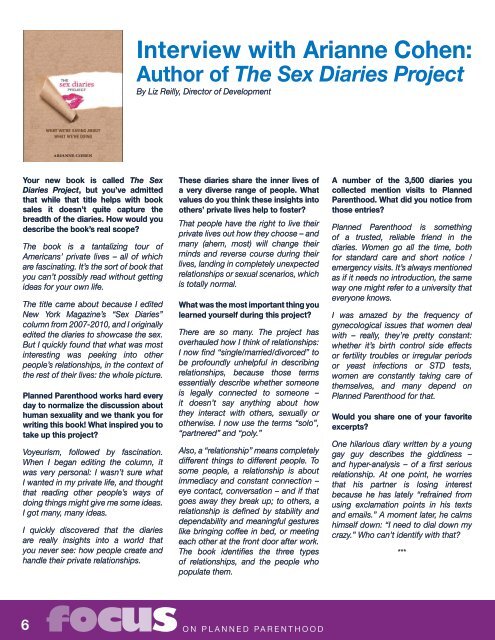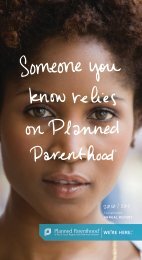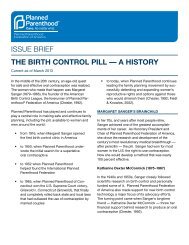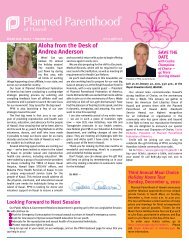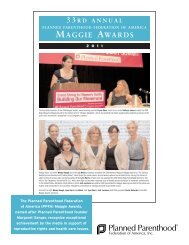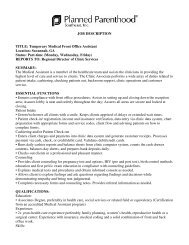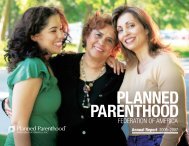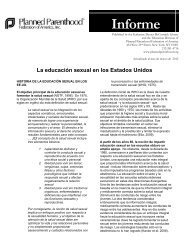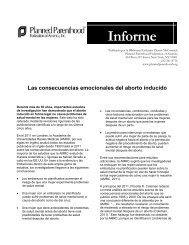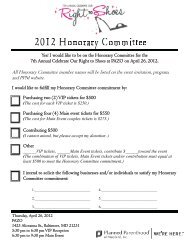FOCUS- Fall - Planned Parenthood
FOCUS- Fall - Planned Parenthood
FOCUS- Fall - Planned Parenthood
Create successful ePaper yourself
Turn your PDF publications into a flip-book with our unique Google optimized e-Paper software.
Interview with Arianne Cohen:<br />
Author of The Sex Diaries Project<br />
By Liz Reilly, Director of Development<br />
Your new book is called The Sex<br />
Diaries Project, but you’ve admitted<br />
that while that title helps with book<br />
sales it doesn’t quite capture the<br />
breadth of the diaries. How would you<br />
describe the book’s real scope?<br />
The book is a tantalizing tour of<br />
Americans’ private lives – all of which<br />
are fascinating. It’s the sort of book that<br />
you can’t possibly read without getting<br />
ideas for your own life.<br />
The title came about because I edited<br />
New York Magazine’s “Sex Diaries”<br />
column from 2007-2010, and I originally<br />
edited the diaries to showcase the sex.<br />
But I quickly found that what was most<br />
interesting was peeking into other<br />
people’s relationships, in the context of<br />
the rest of their lives: the whole picture.<br />
<strong>Planned</strong> <strong>Parenthood</strong> works hard every<br />
day to normalize the discussion about<br />
human sexuality and we thank you for<br />
writing this book! What inspired you to<br />
take up this project?<br />
Voyeurism, followed by fascination.<br />
When I began editing the column, it<br />
was very personal: I wasn’t sure what<br />
I wanted in my private life, and thought<br />
that reading other people’s ways of<br />
doing things might give me some ideas.<br />
I got many, many ideas.<br />
I quickly discovered that the diaries<br />
are really insights into a world that<br />
you never see: how people create and<br />
handle their private relationships.<br />
These diaries share the inner lives of<br />
a very diverse range of people. What<br />
values do you think these insights into<br />
others’ private lives help to foster?<br />
That people have the right to live their<br />
private lives out how they choose – and<br />
many (ahem, most) will change their<br />
minds and reverse course during their<br />
lives, landing in completely unexpected<br />
relationships or sexual scenarios, which<br />
is totally normal.<br />
What was the most important thing you<br />
learned yourself during this project?<br />
There are so many. The project has<br />
overhauled how I think of relationships:<br />
I now find “single/married/divorced” to<br />
be profoundly unhelpful in describing<br />
relationships, because those terms<br />
essentially describe whether someone<br />
is legally connected to someone –<br />
it doesn’t say anything about how<br />
they interact with others, sexually or<br />
otherwise. I now use the terms “solo”,<br />
“partnered” and “poly.”<br />
Also, a “relationship” means completely<br />
different things to different people. To<br />
some people, a relationship is about<br />
immediacy and constant connection –<br />
eye contact, conversation – and if that<br />
goes away they break up; to others, a<br />
relationship is defined by stability and<br />
dependability and meaningful gestures<br />
like bringing coffee in bed, or meeting<br />
each other at the front door after work.<br />
The book identifies the three types<br />
of relationships, and the people who<br />
populate them.<br />
A number of the 3,500 diaries you<br />
collected mention visits to <strong>Planned</strong><br />
<strong>Parenthood</strong>. What did you notice from<br />
those entries?<br />
<strong>Planned</strong> <strong>Parenthood</strong> is something<br />
of a trusted, reliable friend in the<br />
diaries. Women go all the time, both<br />
for standard care and short notice /<br />
emergency visits. It’s always mentioned<br />
as if it needs no introduction, the same<br />
way one might refer to a university that<br />
everyone knows.<br />
I was amazed by the frequency of<br />
gynecological issues that women deal<br />
with – really, they’re pretty constant:<br />
whether it’s birth control side effects<br />
or fertility troubles or irregular periods<br />
or yeast infections or STD tests,<br />
women are constantly taking care of<br />
themselves, and many depend on<br />
<strong>Planned</strong> <strong>Parenthood</strong> for that.<br />
Would you share one of your favorite<br />
excerpts?<br />
One hilarious diary written by a young<br />
gay guy describes the giddiness –<br />
and hyper-analysis – of a first serious<br />
relationship. At one point, he worries<br />
that his partner is losing interest<br />
because he has lately “refrained from<br />
using exclamation points in his texts<br />
and emails.” A moment later, he calms<br />
himself down: “I need to dial down my<br />
crazy.” Who can’t identify with that?<br />
***<br />
6 ON PLANNED PARENTHOOD


